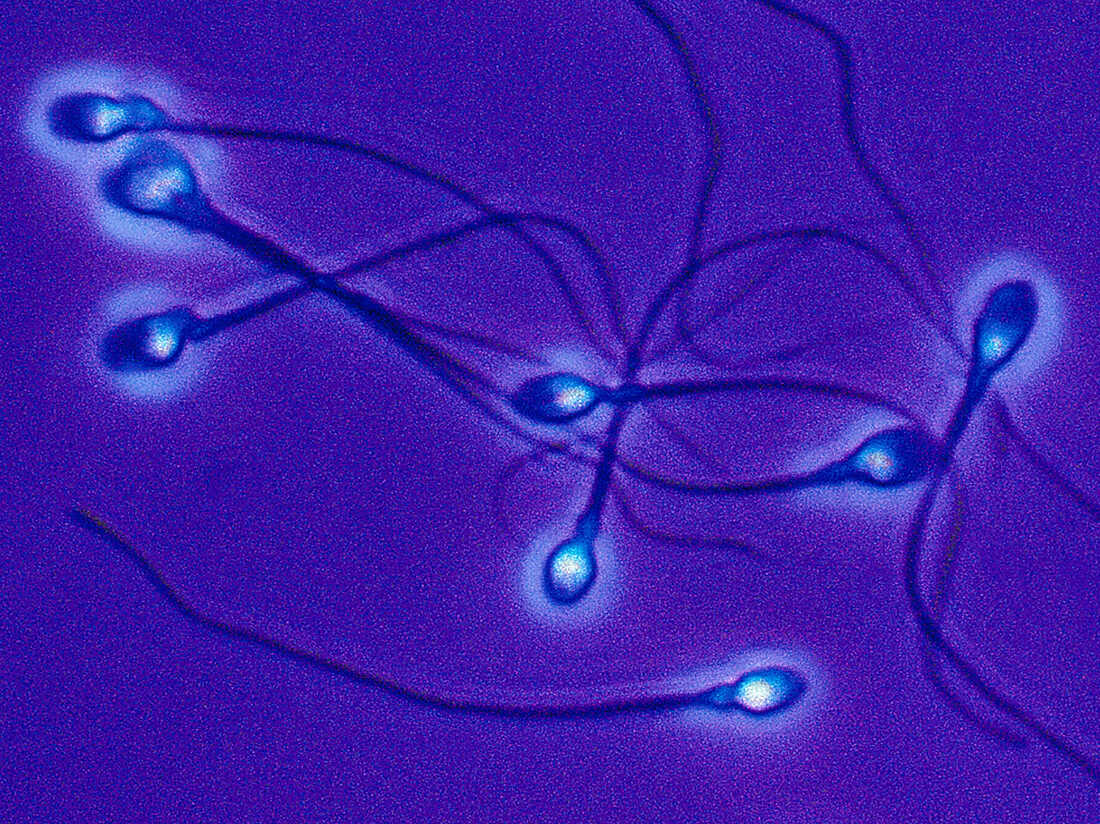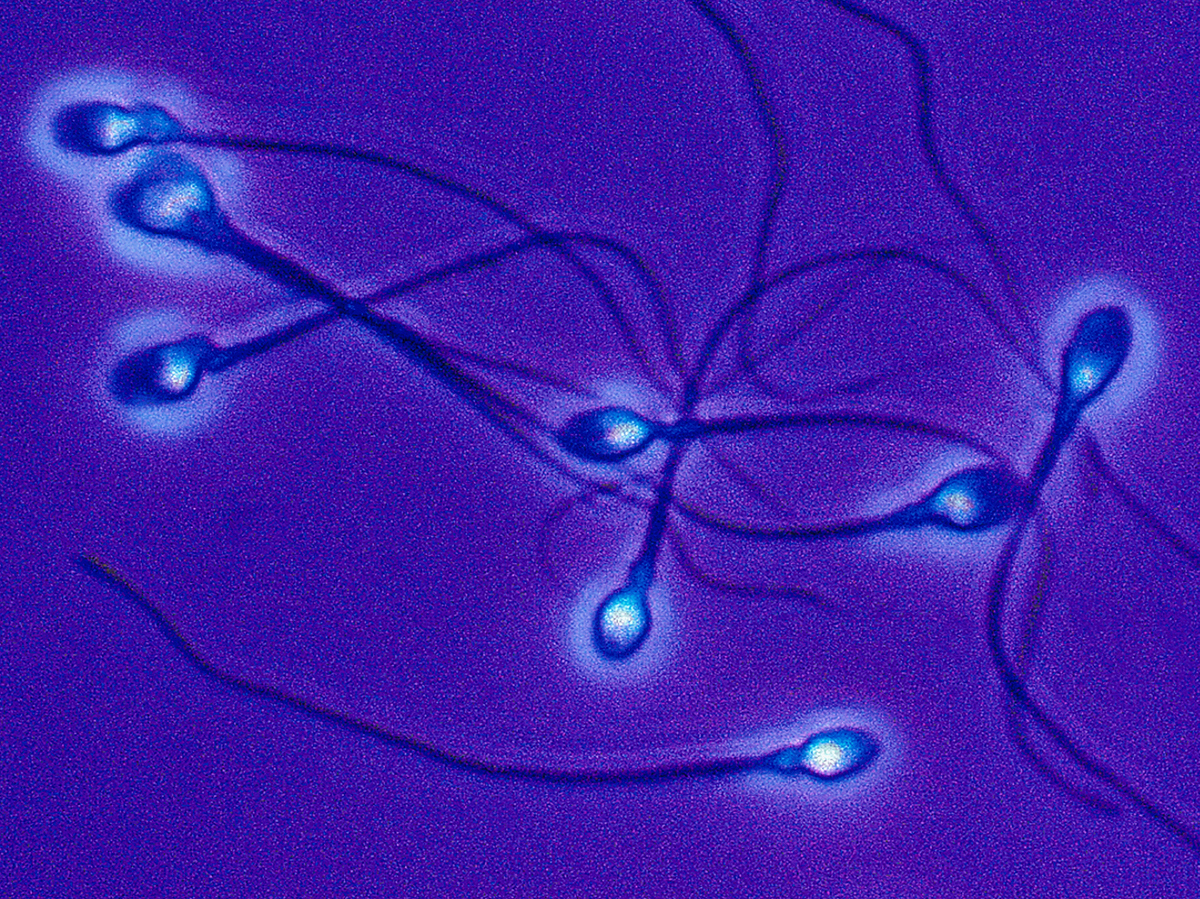
[ad_1]

Researchers are testing a promising strategy to male contraception, one which includes immobilizing sperm.
Derek Berwin/Getty Images
conceal caption
toggle caption
Derek Berwin/Getty Images

Researchers are testing a promising strategy to male contraception, one which includes immobilizing sperm.
Derek Berwin/Getty Images
The current choices for male contraception are condoms, vasectomies or abstinence.
So the work of stopping undesirable pregnancies usually falls to ladies, who might take every day contraception drugs, get an IUD implanted, put on vaginal rings, use a diaphragm – or when all else fails, take the morning-after tablet.
Scientists are making progress on extra choices for sperm-producers. A paper revealed Feb. 14 within the journal Nature Communications, presents a novel strategy to male contraception that appears promising in mice. Researchers examined a compound that blocks an enzyme sperm must swim, suggesting a path to a fast-acting, momentary type of contraception. (Though examined in mice, many species together with human males have the identical enzyme.)
“Our lab found the on-switch that turns sperm on to move,” says Jochen Buck, a pharmacologist at Weill Cornell Medicine and co-author on the paper, “And we’ve now developed a compound which inhibits it.”
The compound’s potential worth as a male contraceptive was found on a whim. Five years in the past, a graduate pupil at Buck’s lab needed to check it in mice as a attainable therapy for a watch dysfunction. But the coed was fearful of mice so she requested one other post-doc, Melanie Balbach for assist. Balbach agreed, supplied she might additionally verify what occurred to the male mice’s sperm, since she knew the drug acts on an enzyme associated to male fertility.
Balbach offered the outcomes to Buck and lab co-director Lonny Levin at a lab assembly the next week. They have been beautiful: After the male mice have been injected with the compound, their sperm didn’t transfer.
“Lonny’s reaction was, ‘Wow! This means we could develop a male contraceptive,'” Buck recollects, “And my reaction was, ‘Lonny, it’s even better. We can have an on-demand male contraceptive.'”
The drug stopped sperm from swimming, slowing their fast-beating tails to a twitch. In people, this might imply they’d by no means make it out of the vaginal canal previous the cervix into the uterus. Further analysis confirmed that it was fast-acting, taking about fifteen minutes to have an impact. And it was momentary — it stayed within the system for a number of hours.
In these hours, the female and male mice within the research had loads of intercourse. Within 2.5 hours after getting the drug, it was100% efficient at stopping pregnancies. Within 3.5 hours, it was 91% efficient.
Buck has nice hopes that it’ll work the identical in people. “The prediction is, after half an hour or after five hours or after eight hours, [their] sperms do not move — and a day later, two days later, they are back to normal,” he says.
Experts not affiliated with the research discover it promising, however warning that medicine that work in mice do not all the time work in individuals.
“It’s very early,” says Dr. Michael Eisenberg, a urologist and director of the Male Reproductive Medicine and Surgery Program at Stanford Medicine. “The idea of an on-demand pill that could potentially impair fertility is exciting, but any time a study is done in mice, you have to repeat it and make sure it’s valid in humans, too.”
Dr. John Amory, a professor of drugs on the University of Washington, who’s presently researching a type of male hormonal contraception on human topics, says the brand new compound is a “great idea.”
“It’s an open question how well this approach would translate from mice to humans,” he provides. “There are differences in the reproductive physiology between species, but it’s worth testing.”
The drug targets an enzyme in sperm that is the identical throughout many mammals. The researchers at the moment are attempting it on rabbits, and goal to begin human trials in two to a few years.
The demand for male contraceptives is there, Eisenberg says. “There’s no question there’s a big need. When you look at surveys of men, especially young men, a lot of them are very interested in having some [more] options.”
Some different experimental concepts, like hormonal drugs, gels and injections for males, can take weeks to begin working. Some may cause temper disturbances, have an effect on alcohol tolerance, or shrink individuals’s testicles. Since male contraceptives are geared in the direction of wholesome males, “the tolerance for side effects is going to be very, very low,” Eisenberg says, “[The gains] have to be pretty specific without many of these off-target effects.”
The negative effects for this new potential therapy in people aren’t but identified, however having a male contraceptive therapy that may be taken as wanted might scale back these dangers, says Amory. Unlike some hormonal approaches, which have to be taken every day, “you’d only take it episodically, so there’s less worry about chronic toxicities.”
According to the researchers, the research topics fared effectively. “Look, our mice would never have intercourse if they were in pain,” Buck says. If all goes effectively, he says, he hopes the drug could be out there some eight years from now.
Is this lifelike? Possibly. “The joke in the field is: a male contraceptive has been 5 to 10 years away for the last 40 years,” says Amory. “It’s always just around the corner.” Technology does proceed to maneuver ahead, he says, and ultimately, society will get there.
[adinserter block=”4″]
[ad_2]
Source link
